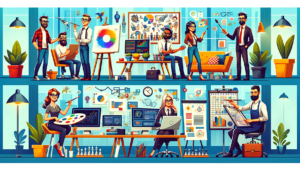Lifelong learning: An organizational success lifeline to replace one-and-done learning
- 6 Min Read
Dr. Keith Keating presents lifelong learning, a comprehensive approach to replace traditional learning paradigms and one-and-done learning for an era of uncertainty and adaptability
- Author: Keith Keating
- Date published: Aug 30, 2023
- Categories

In today’s fast-paced, increasingly digitized business landscape, we cannot overstate the critical importance of lifelong learning. As talent practitioners and leaders, we’ve become acutely aware that the skills and knowledge of today might not serve the demands of tomorrow. The concept of being a learner itself has shifted. No longer is it relevant to frontload learning early in life, get a job, and then retire. To be agile and adaptable, one must learn, unlearn, and relearn – repeat. This is the lifecycle of lifelong learning. It’s an ongoing challenge that prompts us to reevaluate traditional learning paradigms, and it requires us to foster a culture of continuous learning and adaptability in our organizations.
The imperative of lifelong learning
The digital revolution, with its artificial intelligence, machine learning, and automation capabilities, has vastly changed the nature of work. Routine tasks are now being automated, and the demand for more cognitive, creative, and interpersonal skills is on the rise. In this milieu, traditional one-and-done learning and development strategies can no longer keep pace.
Whether it be the World Economic Forum, Deloitte, or McKinsey Global Institute, research-based authority institutions alike are consistently raising the alarm on the need for skilling, upskilling, and reskilling. The World Economic Forum (and others) have gone as far as to say the half-life of learned skills is now just five years, meaning that half of what employees learn today will be irrelevant or outdated in the next five years. This stark reality underscores the need for continuous learning, where the acquisition of knowledge and skills is an ongoing process, extending throughout an individual’s professional life – thus, the concept of lifelong learning.
Lifelong learning is a comprehensive approach to learning that encourages individuals to acquire knowledge, skills, and attitudes needed to navigate the complex, changing world of work. It promotes adaptability, enhances problem-solving capabilities, and stimulates creativity and innovation – traits that are increasingly vital in the evolving business landscape.
Approaching lifelong learning
Organizations often make the mistake of limiting lifelong learning to professional development. However, it’s crucial to remember that lifelong learning also encompasses personal development, promoting curiosity, self-reflection, and resilience. This approach helps in fostering a mindset of adaptability, a trait that is essential in today’s disruptive work environment.
When implementing lifelong learning, it’s crucial to apply the principles of adult learning. Adults learn best when the learning is relevant, self-directed, practical, and delivered in an engaging, interactive manner. Therefore, organizations must design learning programs to be flexible, personalized, and rooted in real-world contexts.
Microlearning, learning sprints, on-demand learning resources, and mentoring are effective strategies to support lifelong learning. Additionally, using AI and machine learning technologies can help create adaptive learning environments that can personalize learning to suit individual learning needs and styles.
Creating a lifelong learning culture
Cultivating a culture of lifelong learning within an organization requires a shift from traditional learning methods to an approach that promotes continuous learning. Here are a few steps organizations can take:
1) Championing learning through leadership support
To foster a culture of lifelong learning, leaders must pave the way by becoming proponents of learning themselves. They should stress the importance of learning and showcase its direct influence on overall performance. By promoting a growth mindset, they set the tone for an environment that encourages continuous learning. Providing employees with time and necessary resources to learn highlights an organization’s commitment to personal and professional growth. When employees see leaders actively participating in and encouraging learning, it makes the initiative more credible and influential within the organization.
2) Developing personalized learning pathways
Individual learning needs and goals differ greatly among employees, and a one-size-fits-all approach is often ineffective. Empowering employees to take control of their learning journey fosters greater engagement. By providing a wide array of learning resources, organizations give employees the flexibility to choose what best aligns with their learning styles, interests, and career goals. This also allows individuals to feel more invested in their learning, leading to higher retention and application of knowledge.
3) Recognizing and rewarding learning
To further reinforce a learning culture, organizations must integrate learning into their performance management systems. Recognizing and rewarding employees who take the initiative to learn and apply their new skills to their work is a powerful motivator. Not only does this encourage individual employees, but it also conveys a clear message about the organization’s dedication to learning. It paints a picture of an organization that values continuous growth and improvement, making it a more appealing workplace overall.
4) Embedding learning in the flow of work
The next step is to intertwine learning with everyday work. This can be done by creating learning opportunities directly linked to the job at hand, such as on-the-job training, job rotation, or project-based learning. By integrating learning into daily work processes, employees can directly apply and reinforce the knowledge they’ve gained. This “learn while you work” strategy makes learning more accessible and directly applicable, reducing the gap between knowledge acquisition and application.
5) Promoting a culture of knowledge sharing
Another key factor in promoting lifelong learning is to encourage knowledge sharing across the organization. Implementing platforms for employees to share their insights and learn from their peers can significantly boost collective knowledge within the organization. This could take various forms, such as mentoring programs, online discussion forums, or social learning platforms. Such practices not only facilitate knowledge transfer but also foster a sense of community and collaboration among employees.
6) Leveraging technology for learning
The final step involves harnessing the power of digital platforms and tools to deliver personalized, adaptive, and readily available learning. With AI and data analytics, organizations can gain deeper insights into learning behaviors, track progress, and provide timely feedback. Such technological interventions make learning more interactive, engaging, and effective. They also allow organizations to tailor learning to individual needs, thereby maximizing the learning outcomes, and enhancing the overall learning experience.
The need for lifelong learning
As we move forward, the importance of lifelong learning will only increase. The landscape of work will continue to shift, bringing new challenges and opportunities. The organizations that will thrive are those that can cultivate a culture of learning, where employees are continually updating their skills, learning new ones, and adapting to the changing business environment. This isn’t just about survival; it’s about creating workplaces that are vibrant, innovative, and adaptable, capable of tackling the challenges of tomorrow with knowledge, skill, and confidence.
Instilling lifelong learning ensures talent remains agile, adaptable, and ready to fill the next organizational gap. In today’s work climate, lifelong learning paves the way for current and future success.








